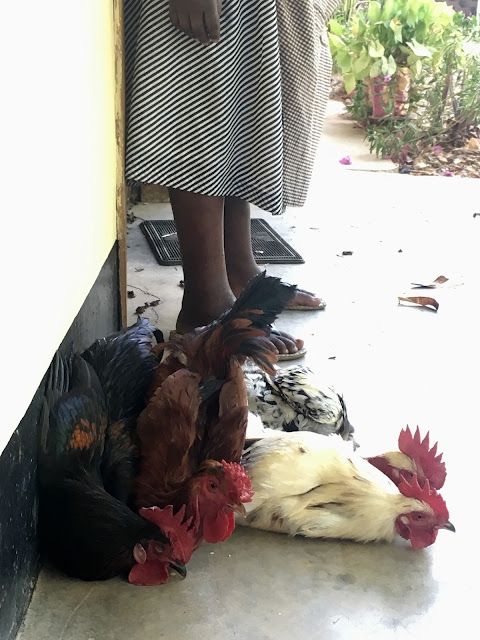How to BE Here
I have three delicious, plentiful, and healthy meals each
day but I am reminded constantly of the suffering of so many people in this
region. In many interactions at school,
many people show a desire to care and protect me. They do this by teaching me how to tell folks
that I do not have any food or to say, ‘I have nothing’. I always reply in these well-meaning conversations
that I want to learn to say more than just ‘no, I have nothing.’
How can I learn to say ‘I’m sorry’ or something kind to
those people in the trading centre, predominantly older, fragile women. What is the right thing to say? Is there a right thing to say? If I
were to give to one, what would I say to the next? It feels like a cheap lie to utter the
sentence ‘I have nothing’; the only thing that rings true about it is that it
may be true in this world of ‘alternative facts’.
Sure, we have all dealt with what to say, how to acknowledge
and what to do in a world where there are so many suffering from poverty. They exist here in Uganda but also on the
corners of our New York streets, on the exit ramp of our southwestern cities
and hiding in plain sight behind some of the wealthiest colleges in
Oxford. But here it feels more
immediate, intimate, troubling. Perhaps
it is because I stick out, the muzungu
among the villagers. Perhaps it is because
here I might be able to escape the hunger, but I cannot escape the brutal
conditions of this dusty, windy and arid desert. Here the dirt stings my eyes, the heat
kidnaps my energy and the sun burns my fair skin.
At times, I focus on how to perfectly pronounce my sentences
in their language so as not to get emotional and think too deeply about their
situation. But I can still feel my shame
and feeling of helplessness or hopelessness when my body involuntarily begins
to lower and my head hangs heavy as I search in desperation for a friendly exit
from this interaction. But instead of
becoming immune to their misery, I hope my body continues to reflect a deep
sadness in its bashful bow.
Last week at the market, there were too many older, worn and
frail women asking for food. It was gut
wrenching to ‘Sorry, no food’ to older women who like they haven’t eaten in
days and need at least a glass of water.
I feel ashamed to say it because it’s only technically true that I am not
holding any food but I know I will head back to school and have a full belly
after my lunch, dinner and breakfast the next day. Saying yes then becomes a never-ending effort
to feed undernourished older women…and then where does it start and stop? It feels like playing God to me and while I
know there are people on this earth who have the tragic duty and job to do this
work, I do not have a heart strong enough for this kind of work. I need to stick to school life – where there
is plenty of sorrow to go around in the nicest wealthiest schools to the
poorest of the poor. Kids have problems;
I have had plenty of kiddos coming to class hungry or staying to share my lunch
with me but this material lack of food and nourishment is on another level.
It only got worse when we were buying some fish. I was buying some dried out, blackened old
fish about the size of my hand, bargaining for the price as the crowd of women
gathered to watch and others to ask for food.
The truth is I’m buying the fish for the cat outside my house whom I’ve
adopted. The man who tends to our
chickens wanted to kill the cat over Christmas because it ate a baby
chick. Instead of killing the cat, I
made a deal at the house to feed the cat so they won’t kill it. Yes, I’m trying to save the cat, but I’m also
concerned about keeping the rodents at bay…and honestly, I want the cat to be
my little companion. So yes, I’m buying
fish.
 |
| Inti (in tee) - my adopted cat. |
But just as I told the ladies, ‘sorry, no food’, Harriet my
guide told them I was buying food for a cat…for a cat and not a person. They were flabbergasted, amazed, dumbfounded,
shocked you name it. I couldn’t tell
what happened until Harriet said, ‘I told them you were buying fish not for
them but for the cat.’ My response, ‘Maybe
next time we just tell them it’s for the house.’
I ponder how to help and I am reminded of my ever so wise
friends and religious sisters. Before
moving to the US/Mexican border over a decade ago, it was instilled in me that
the best thing I can do is just be –
to be with people on their journey. I remember
a conversation where I asked my dear friend and religious sister if she had
considered opening a shelter for abused women.
Her reply was that if we opened a shelter we would have to take in the
entire town. She reiterated that we must
do the work that we can, that we have the ability to do and part of that work
was to be with people.
Here I must believe that my research is worth doing, that my
research will help bring hope and a better life to many and in the meantime, I will
try to simply be with people.





No comments:
Post a Comment